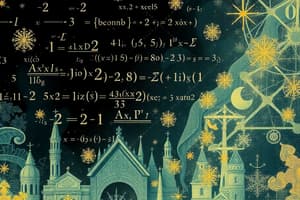Podcast
Questions and Answers
What is the main focus of algebra?
What is the main focus of algebra?
- Graphing functions on a coordinate plane
- Conducting statistical analysis
- Performing operations with letters instead of just numbers (correct)
- Solving geometry proofs
What do variables in algebra typically represent?
What do variables in algebra typically represent?
- Historical figures
- Unknown quantities or solutions (correct)
- Physical constants
- Geometric shapes
How do algebraic expressions differ from numerical expressions?
How do algebraic expressions differ from numerical expressions?
- Numerical expressions involve solving for unknown variables
- Numerical expressions use letters instead of numbers
- Algebraic expressions contain variables representing numbers we choose (correct)
- Algebraic expressions only use whole numbers
What core vocabulary is essential for algebraic equations?
What core vocabulary is essential for algebraic equations?
How does algebra contribute to solving real-world problems?
How does algebra contribute to solving real-world problems?
In algebra, what do equal signs indicate?
In algebra, what do equal signs indicate?
What is the purpose of manipulating variables in algebra?
What is the purpose of manipulating variables in algebra?
Which concept in algebra allows us to solve any second degree equation?
Which concept in algebra allows us to solve any second degree equation?
What kind of problems is abstract algebra particularly helpful for?
What kind of problems is abstract algebra particularly helpful for?
In algebra, what do the letters 'x' and 'y' often represent in linear equations?
In algebra, what do the letters 'x' and 'y' often represent in linear equations?
How does algebra aid in representing complex information?
How does algebra aid in representing complex information?
What makes algebra a powerful tool for understanding quantities?
What makes algebra a powerful tool for understanding quantities?
Flashcards are hidden until you start studying
Study Notes
Algebra is a fundamental aspect of mathematics, involving the manipulation of symbols according to certain rules called algorithms. It refers to the branch of arithmetic where numbers can represent abstract quantities such as variables, unknowns, and solutions. In other words, it's all about performing operations with letters instead of just numbers, allowing us to generalize our understanding beyond specific cases.
At its foundation, algebra revolves around expressions containing one or more variables, which are letters representing any number we choose. These variables undergo mathematical operations like addition, subtraction, multiplication, division, and exponentiation. By symbolizing these operations with basic arithmetic notation, we have the core vocabulary of algebraic equations. Some examples of variable definitions used in algebra include (x), (y), (z), and so forth. We also use equal signs to show relationships between expressions, indicating they contain the same value.
Algebra plays a crucial role in solving real-world problems by expressing their characteristics numerically. By setting up models using variables, we can analyze situations quantitatively without needing every detail available. This allows us to make predictions based on limited information—a powerful technique when dealing with complex systems. For example, if we know two sides of a right triangle and want to find the third side, algebra provides formulas from geometry that let you do this.
In summary, algebra helps simplify math through symbolization, enabling us to understand patterns across different numerical scenarios. Its applications range from predictive modeling to problem-solving, making it essential for anyone interested in mathematics and scientific thinking.
Studying That Suits You
Use AI to generate personalized quizzes and flashcards to suit your learning preferences.




